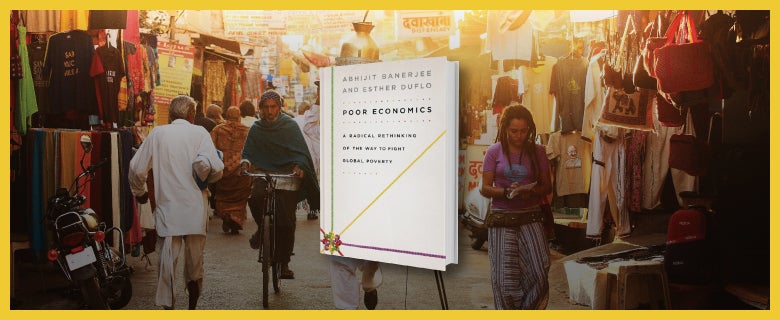Today, there are only three countries left that are still polio-endemic: Pakistan, Afghanistan, and Nigeria.
As I prepare for the G20 summit, I firmly believe that data has to be at the core of the analysis and conclusions in our report on development. At the same time, we need to look beyond the numbers and understand the everyday challenges faced by the world’s poorest people. The book Poor Economics is very helpful, because it is both empirically rigorous and insightful about the realities that the data doesn’t always capture.
Poor Economics is by two MIT economists, Abhijit Vinayak Banerjee and Esther Duflo. Their life’s work is traveling to poor countries, looking closely at what works and what doesn’t work in efforts to fight hunger and disease, improve education, and broaden access to basic financial services. The authors are directors of J-PAL, an MIT poverty action lab that’s a network of 59 professors around the world who use scientific methods to answer critical questions about alleviating poverty.
To me, what’s really great about J-PAL is that it’s producing scientific evidence that can help make our anti-poverty efforts more effective. This is tremendously important. The money that governments invest in development is saving millions of lives, and improving hundreds of millions. But to sustain support for these efforts, we need to rigorously assess the cost-effectiveness and overall impact of aid, and make continuous improvements.
J-PAL conducts randomized evaluations of different approaches to achieving a particular objective, such as reducing malnutrition. For example, researchers try different ways of distributing food aid in similar villages, observe what happens, and compare the results. They’ve repeatedly found that outside of situations where there’s actual famine, just handing out food – no matter how nutritious – doesn’t necessarily improve nutrition. Sometimes people just cut back on their own food purchases and use that money for something else they need or want, even though consuming more calories could increase their productivity.
Although this may seem strange to us, J-PAL probes deeper to find out why people do what they do. In some instances, they may be in a situation where consuming more calories to work harder will not raise their incomes much or at all. And they may have other, urgent expenses, such as for health care.
Poor Economics does a great job of bringing alive the complexities of poor people’s lives. It explores the tough, difficult decisions they must make – often based on very little information and with no room for error – about things that most of us take for granted, like access to enough food, clean water or vaccinations.
Poor Economics focuses on the specific results and unintended consequences of anti-poverty projects, and in doing so, it reveals some smart strategies for achieving positive results. In some situations, for instance, limited aid may go farther if it is directed toward specific groups of people. One example mentioned in the book is delivering food aid and nutrition information to pregnant women and to children whose development can be permanently stunted by malnutrition.
Related to food aid, one of the “win-win” strategies we’re using at the foundation is helping poor farmers sell their produce to aid programs in their own and neighboring countries. That way, the aid programs can fight hunger and help raise the incomes of local farmers at the same time.
Poor Economics also is very good in spotlighting how small tweaks can sometimes turn failing interventions into effective ones. As I’ve learned, this often involves identifying and removing unintended barriers that prevent people from getting vaccinated, say, or using bed nets to prevent malaria. Given the challenges that poor people face in their daily lives, we need to make it as easy as possible for them to get the help they need.
For example, Rajasthan, India, had for a long time suffered from very low immunization rates – about 6%. This despite the government’s providing the vaccines for free. Increasing the vaccination rate was a challenge – walking to the clinics can be a hassle, and the clinics are unpredictably closed. To address these barriers, mobile clinics were established to provide vaccines on site. The impact of these mobile clinics was profound, with full vaccination rates jumping from 6% to more than 18%. Building on this success, the program was further enhanced with an incentive: a bag of lentils to all families vaccinated, which effectively doubled the rate again to 38%. Even with the incentive, the program was twice as cost effective per patient as just the mobile clinics alone, since the clinic staff was much busier. More importantly, a much larger group of children was vaccinated against polio, measles, DPT and tuberculosis – saving families from potential tragedy down the road and government from higher costs of sick care. You can read the J-PAL policy briefcase “Incentives for Immunization” to learn more about this study.
To be more effective, we also need a deeper understanding of people’s values and cultures. I’ve seen first-hand that local knowledge is critical. A couple of years ago, I visited AIDS-prevention projects that our foundation has supported in South Africa. They were effectively reducing AIDS transmission from women to men by persuading adult and teenaged men to be circumcised. As you can imagine, this was not an easy task, but with knowledge and respect, it can be done, and it can save many lives.
With the authors’ experience on the ground and their willingness to go where the evidence leads, I found Poor Economics a refreshing change from the sometimes theoretical and divisive debates that surround development aid. (An excellent companion book I’d also recommend is Getting Better: Why Global Development is Succeeding.)
So, is development aid good or bad? A moral obligation or a waste of money? That depends on how it’s done, say Banerjee and Duflo. Financial resources are finite, so let’s figure out how to use them in ways that can have the most substantial impact.





